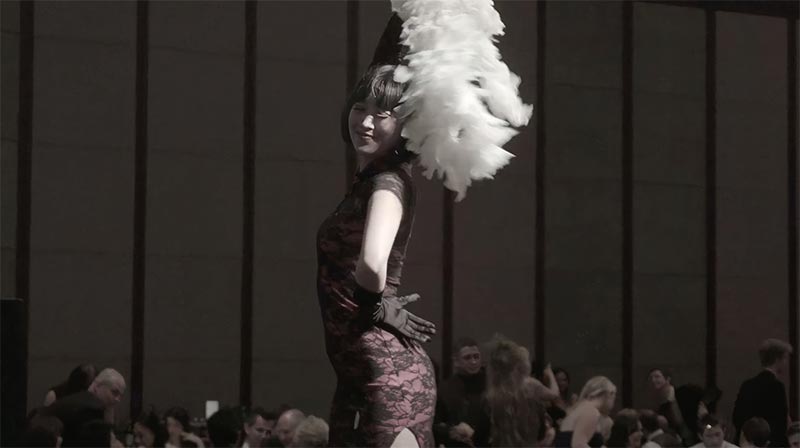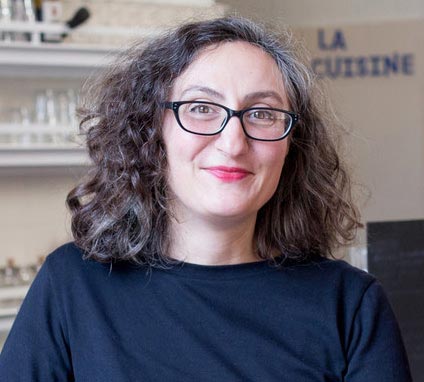
21 Mar Coralie Van Rietschoten, Director of 2022 Official Selection Winner Chinese Cancan: Lulu, a Chinese Woman Will Be April SPEAK EZ Guest
Everyone has their own values and views about Free Speech. However, many people feel they are too reserved to share those views or they may fear the consequences of making their thoughts known. Director Coralie Van Rietschoten discovered that the best way for her to speak out was to film someone who wasn’t afraid to express herself.
That decision led to the creation of the documentary Chinese Cancan: Lulu, a Chinese Woman, which was a 2022 Free Speech Film Festival Official Selection winner. The film chronicles how burlesque dancer Lulu Galore expresses herself in an authoritarian regime like China. As the movie’s description says, “In China, like everywhere, a woman’s place in society is linked to politics and tradition. But China’s politics and tradition make a unique setting on earth. It’s within this context that Lulu emerges.”
Coralie is a self-professed shy person but found strength in sharing Lulu’s story.

Coralie Van Rietschoten, director of 2022 Free Speech Film Festival Official Selection winner Chinese Cancan: Lulu, a Chinese Woman.
“I used to be very shy and filming a documentary was way out of my comfort zone. But, filming someone like Lulu, a daring burlesque performer, pushed me to dare more and more, too. Although I chose another way of expressing myself than undressing!,” she said.
Before Coralie visited China for the first time in 2010, she assumed everyone there was either a “patriot” or a “dissident” but she found Lulu lived her life in the middle – saying and doing exactly what she wanted to without suffering the consequences of her actions from the authorities.
“I had two clichés about Chinese people in my mind. Cliché number one: the patriot, with a CCP card and a vision of the world through the eyes of propaganda. Cliché number two: the dissident, shouting out loud against the CCP, ending up in jail,” Coralie said. “Some real people look like those clichés, but the majority don’t, and Lulu is one of them. She somehow manages to do what she wants, but she never confronts the authorities directly. She plays a tricky game, flirting with the limits. I hope some occidental viewers will discover this other way of living in China. In general, I think it’s interesting to study what’s happening in China, because we’re impacted by it without knowing it, and because it’s too easy to think we’re just very different.”
Coralie said it’s important for everyone to remember that we all have the right to freedom of speech. While she doesn’t feel that filmmakers will ever transform the world, she sees the power that film has to change people’s minds.
“I’m not sure films can change the world in a direct way. China won’t change because we make films about it. But I think films can change the viewer’s understanding of the world,” she said.
“In Europe and in the U.S., we are surrounded by a very strong storytelling about China. We forget that life is often more complex and full of nuances. Some viewers told me ‘I’ve never seen a character like her in a movie shot in China.’ If just one viewer changes his or her way to look at something, then I guess the film did change the world.”
Ultimately, Coralie believes that in order for the world to get to a place where everyone can speak freely, we need to eliminate the negative connotations that the words “free speech” carry.
“I quite agree with (American linguist Noam) Chomsky: ‘If you believe in freedom of speech, you believe in freedom of speech for views you don’t like.’ In recent years, in our democracies, we tend to talk about freedom of speech as if it was a problem – extreme right rising, activists monopolizing the debate, polarization on social media, etc. I think the real issue isn’t that people say this or that. I agree to disagree with a lot of different points of view. I even disagree with some stupid things I’ve said in the past,” she said. “So, the problem is not that some individuals say this or that. The real problem, I think, is that a few industries (TV, Internet giants) tend to exacerbate extreme positions and make profit out of fear, hate speech and viral nonsense. And the legal or institutional response to that has been almost nonexistent. We do have a problem, but I believe the problem is not free speech. In China, censorship is supposed to be for the best interest of the people, for security and stability. We should try to find solutions for our democracy different than the ones China or other authoritarian regimes have to propose.”
When asked how those who live in a place where they don’t have freedom of speak could make a difference in their communities, Coralie said she’s divided on what she feels people should do.
“As a friend or a mum, I would probably say ‘Don’t put yourself at risk, don’t speak out.’ But from faraway, I would probably say ‘Be brave, speak out.’ Some have to do it, but it’s oftentimes a very big sacrifice they make,” she said. “If you don’t feel like speaking out loud yourself, maybe you can whisper and sustain people who speak out so they’re not alone.”
In fact, Coralie feels that it’s important for people to educate themselves – and realize there are not only two sides to every issue – before they begin to speak out.
“Don’t feel like you always have to define yourself as quickly as possible by saying ‘I’m against this, pro that.’ Changing your mind or hesitating is a healthy approach to any problem. Usually there are more than two sides to every story. Look for nuances, complexity, different points of view,” she said. “And read articles and books! Also, travel, if you can. Get out of your comfort zone. It will help you understand other communities and also yours. Do your homework before you jump to any conclusion. This way, you will avoid many clichés and biases, and your voice will be louder and clearer once you decide it’s time to speak out.”
Although she’s now an award-winning director, Coralie said she she found her way behind the camera later in her career but it has sparked a passion in her and she’s currently working on two more films.
“I was an editor for 15 years and really enjoyed it, too. I started filming to help a friend. Then I found along my way some subjects I thought someone had to make a documentary about. I’m very glad to be a “young” filmmaker at more than 40 years old and try to keep going on,” she said. “I’m currently finishing two documentaries: “Digital Revolution Is Not a Dinner Party,” about the digital world in China, which, once again, is about free speech, and “No Filter Café,” co-directed with Galaad Hemsi, about five teenagers with severe autism who learn how to cook and serve in a fancy café in the heart of Paris.”
Coralie said she was drawn to submit her film to the Free Speech Film Festival because it had “Free Speech” right in the name and she encourages others to submit their films, too.
—
Photo courtesy of Coralie Van Rietschoten.


No Comments